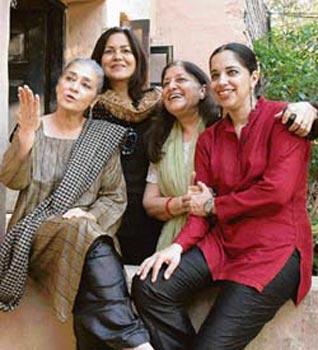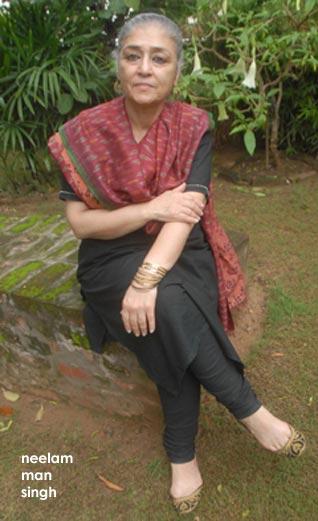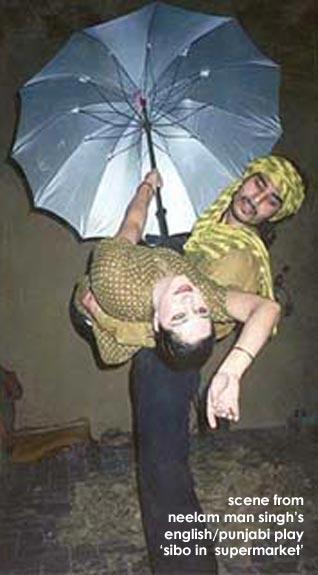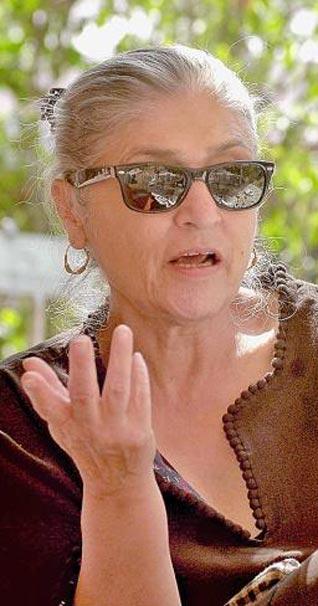
Above: Neelam Man Singh (left), with actors Gick Grewal, Pamela Singh and Ramanjit Kaur from her play, ‘Naga-mandala’.



Film/Stage
Neelam Man Singh: Doyenne of Punjabi Theatre
by P. ANIMA
Cities have nurtured Neelam Man Singh's theatre.
Cities she looked forward to, cities she thought would be home, cities she judged wrongly, cities she didn't want; all played a role, large and small, in evolving her theatre language.
Neelam is indebted to them all. The theatre director went to them with a virgin mind, they led her by the hand, pitched in with wisdom, taught and corrected her. Today her theatre speaks a distinct voice, drama of daring and survival in a sense, and her hallmark - plays in a language never considered trendy, theatrically - Punjabi.
Her repertoire includes striking productions, the English/ Punjabi "The Suit", "Kitchen Katha", "Nagamandala" and the latest - her reading of Rabindranath Tagore's "Stree Patra".
"I need to do more shows of the Tagore play. Each production actually pulls so much out of you."
Neelam puts on her sunglasses, orders a cappuccino, defies the spring sun and talks. About moulding articles a woman finds effortlessly around her - vegetables and eggs, pomegranates and papaya - to be part of her plays; despite being wrung by economics, keeping her group The Company going for the past 27 years; discovering earthiness in the naqqal performers of Punjab and bringing them into the fold; and of course, cities.
The Chandigarh-based director is on one of her frequent visits to the Punjabi Capital, this time as a jury member at the Mahindra Excellence in Theatre Awards festival.
"My parents were in Amritsar and we were quite de-contextualised in terms of an artistic background. My father was a doctor and mom a homemaker, a household where art could be a hobby. In the 1960s and '70s, I wanted to escape Amritsar. Chandigarh seemed like New York City," she says.
Soon, she was pursuing Fine Arts in her "NYC" and had her first tryst with theatre. Ebrahim Alkazi had brought two plays from the National School of Drama to the city.
If one thought the performances led her blindfolded to the NSD, Neelam pitches in, "I was mesmerised by the ease with which the two sexes mingled with each other. Coming from a place where there was such segregation of the sexes and the idea itself so ingrained in us, I wanted to be part of the institution that had this mysterious atmosphere," she says, but asks a touch hassled, "Is it too low brow for you?"
Once the initial wonder wore away in Delhi, she befriended art through her teacher Alkazi. "He made you realise art was hard, yet a way to define life."
Though she revelled in theatre these three years, came to know the Hattangadi-s and the Thiyam-s, Neelam was just about beginning to know her theatre.
"I got married. An arranged one, quite over a cup of tea, and moved to Mumbai." It was a city she looked ahead to. Seniors at NSD, like Om Puri, were there. "We did little bits and pieces there."
Change entered the scene with her husband's transfer to the relatively small and less fashionable Bhopal.
"That was the milestone. I began to build the vocabulary to my theatre. Bharat Bhavan was coming up with B.V. Karanth at the helm. Those four years were euphoria. If Alkazi was the Renaissance man, Karanth, the man of the soil, pitching in for the vernacular, the songs ..."
If Neelam graduated from NSD, Bhopal represented higher studies. She learnt and unlearnt, casting away colonial hangovers having grown up in a community with its pronounced fascination for Western education and made worse by her parents' stay in England for five years.
"I realised theatre can't just be about a production, it has to be woven with tradition even while pulsating with modern idiom." Karanth also gave Neelam the signature of her many productions - music.
Yet when the time came to plunge deeper into her roots, she "floundered". She greeted with mourning the move to Chandigarh. "I thought that was the best place to have my second child. But many things in my life happened by accident. I formed The Company and realised I was there to stay."
A piece of advice from Karanth led the path. "He told me to work with the language of the [land], with content that was bringing with it the energy of generations."
That opened a daunting chapter.
Neelam began by learning Punjabi.
"I was rendered irrelevant at the NSD as I didn't even know Punjabi," she recalls. "It began a journey into theatre, language and myths."
The relatively barren theatre field that Punjab was made her work vexing.
"With Punjab, everyone talked of the Giddha and Bhangra. I needed something I could explore, a vocabulary for training. Then I came upon the naqqals, who were like the jatras of Bengal. But unlike Bengal, Punjab being a hotbed of political and social upheavals, the naqqals couldn't enjoy any continuity of form. They performed at Ramleelas, but were not economically viable."
Working with them, Neelam for the first time became an insider in her own territory. She looked at tradition not as exotica, but as urban language. She generously took on Western texts, but washed them over with the vintage narrative methods, tools and songs.
"Once I take a play and make it my own, I forget the source."
Her productions are an experience with the senses, even the olfactory, as "Kitchen Katha" demonstrated where the audience were treated to pakoras and jalebis. Her raw material is often from home.
"It is linked to being a woman who runs a household. You rummage through a cupboard and find something. Later you translate and transform these metaphors in your narrative."
Neelam who also teaches at the Department of Indian Theatre, Panjab University, asserts theatre is a "financially losing game". At The Company, "There is no money. I do everything, from sets, costume and food to booking tickets. If your group is not going to earn from theatre, then you replace it with good work, decent accommodation, etc."
Finally, Chandigarh. Punjab.
"It is the best thing to have happened. I respond to its rhythm, I can create my world, my history. There are no distractions."
[Cortesy: The Hindu]
March 12, 2011
Conversation about this article
1: Bimal Maskara (Mumbai, India), January 02, 2013, 11:17 PM.
Very interesting. How does one get to see some of your plays in Mumbai? Anything coming up in the near future?


